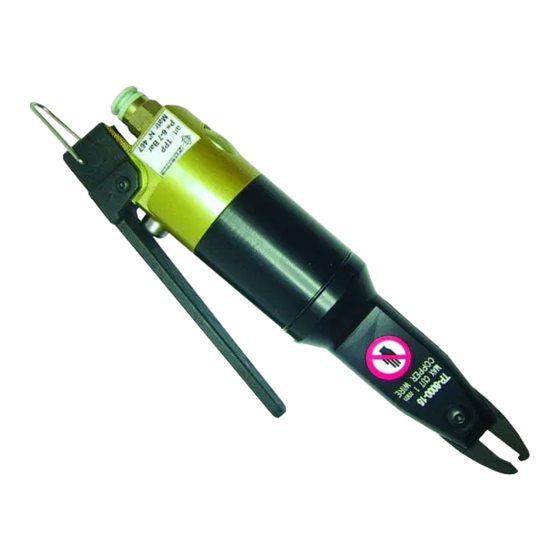
Summary of Contents for Piergiacomi TP-6000
- Page 1 INSTRUCTION MANUAL TR-6000-V TP-6000 TP-6000-15 TR-6000 TS-6000 60° CUT CUT and BEND CUT and BEND CUT and CRIMP INSTRUCTION MANUAL REV. 07 Page 1 Date rev. 28/05/13 Rev. 07...
- Page 2 INSTRUCTION MANUAL INDEX OF CHAPTER This manual contains the following information: - Chapter 1 – Page 3 – Safety symbol and rules to observe - Chapter 2 – Page 4 – Introduction - Chapter 3 – Page 5 – Components parts - Chapter 4 –...
- Page 3 Before any kind of adjustment or registration to be performed on the device, be sure the compressed air supply system is not connected. WARNING!!! Piergiacomi Sud S.r.l. refuses all responsibilities for any damage caused to operators if the device’s chassis has been removed or modified;...
- Page 4 2. INTRODUCTION 2.1 TR-6000 – TR-6000-V Piergiacomi has become aware of the enormous problems associated with staff that, during the working day, carry out multiple cutting operations, in any sector, from electronics to the plastic or rubber industry. We have studied the problem and obtained the TR-6000, thanks to our vast experience in industry tools, the ideal lightweight tool and with reduced costs.
-
Page 5: Components Parts
The TP-6000 or TP-6000-15 proves to be an enormously special tool as it manages to carry out two functions in one operation and furthermore has the advantages of being a lightweight and reduced costs pneumatic tool. - Page 6 INSTRUCTION MANUAL 3.1 TPP Fig. 2 3.2 TP-6000 TP-6000-15 Fig. 3 Page 6 Date rev. 28/05/13 Rev. 07...
-
Page 7: Blade Specifications
The blades are made from grinded & tempered special steel and can be easily replaced, as explained in Chapters 7 of this manual. - TP-6000 Cut & Bend blades for blocking the leads of the component on the PCB. (Max cut 1.02 mm) Fig. 5 – TP-6000 Page 7 Date rev. 28/05/13 Rev. 07... - Page 8 Cut and Bend Blades for blocking the leads of the component on the PCB, to reach very dense areas. (Max cut 1.02 mm) Fig. 6 – TP-6000-15 - TR-6000 Blades TR-6000 are supplied standard with 2 typology of cuts (Fig. 7): - CHAMFERED (code TR-6000): permit also to cut harder components &...
- Page 9 INSTRUCTION MANUAL TR-6000 blade (chamfered cut, Max cut 1.6 mm, Fig. 5) is available in different versions, as shown on our catalogues: - TR-6000 R (Max cut 1.6 mm) with flush cut. - TR-6000 PR (Max cut 1.3 mm) with flush cut, but more pointed tips. - TR-6000 10/13/15 (Max cut 1.6 mm) with flush cut at different height (1.0mm, 1.3mm &...
-
Page 10: Using The Tool
After using, put device in a safety place and disconnect compressed air supply system. The tool should be used at the angle shown in the figures with respect to the working surface. Fig. 11 – TP-6000 Page 10 Date rev. 28/05/13... - Page 11 INSTRUCTION MANUAL Fig. 12 – TP-6000-15 TR-6000 : The most suggested point for cutting is situated at about 1/3 of the cutting length (see Cap.4 Fig. 8). Fig. 13 – TR-6000 Page 11 Date rev. 28/05/13 Rev. 07...
- Page 12 INSTRUCTION MANUAL Fig. 14 – TR-6000-V Fig. 15 – TS-6000 Page 12 Date rev. 28/05/13 Rev. 07...
- Page 13 Fig. 16 Warning! During blade removal, make sure the compressed air supply is shut off. 6.2 TP-6000-15 - TR-6000 - TR-6000-V - TS-6000 - Use the supplied hexagonal key & a slotted screwdriver to remove the ring nut and the M4 screw as indicated on Fig.
-
Page 14: Servicing And Maintenance
INSTRUCTION MANUAL 7. SERVICING AND MAINTENANCE NORMAL SERVICING DAILY : Remove any residual cut material found between the gaps in the head with a compressed air gun. SPECIAL SERVICING EVERY 4 MONTHS : Lubricate the air seals with vaseline oil following the instructions. 1 Remove the compressed air feed tube, put one cubic centimetre of oil in the air connector as shown in the Fig.18;... -
Page 15: Optional Accessories
Blade thickness : 6 mm standard Type of cut : Flush o Chamfered (TR-6000) Type of bend : 90° (TP-6000) or 30° (TP-6000-15) Max cut : 1 mm (TP-6000, TP-6000-15) 1.3 mm (TS-6000, TR-6000 PR, TR-6000-V) 1.6mm (TR-6000, TR-6000-C, TR-6000-... -
Page 16: Declaration Of Conformity
INSTRUCTION MANUAL DECLARATION OF CONFORMITY TPP - TR-6000 / TP-6000 / TS 6000 MODELS : Pneumatic tool to cut electronic components. Pneumatic tool for the depaneling of PCBs. THE TOOLS TPP and DPP ARE CONFORM TO THE ESSENTIAL REQUIREMENTS OF THE FOLLOWING STANDARD OR HARMONIZING...

Need help?
Do you have a question about the TP-6000 and is the answer not in the manual?
Questions and answers